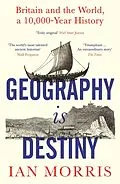'Ian Morris has established himself as a leader in making big history interesting and understandable' Jared Diamond, author of Guns, Germs and Steel
'Morris succeeds triumphantly at cramming 10,000 years of history into a single book' Robert Colvile, The Times
For hundreds of years, Britannia ruled the waves and an empire on which the sun never set - but for
thousands of years before that, Britain had been no more than a cluster of unimportant islands off Europe's north-west shore.
Drawing on the latest archaeological and historical evidence, Ian Morris shows how much the meaning of Britain's geography has changed in the 10,000 years since rising seas began separating the Isles
from the Continent, and how these changing meanings have determined Britons' destinies.
From being merely Europe's fractious, feuding periphery - divided by customs, language and landscape, and always at the mercy of more powerful continental neighbours - the British turned themselves into a United Kingdom and put it at the centre of global politics, commerce and culture.
But as power and wealth now shift from the West towards China, what fate awaits Britain in the twenty-first century?
Autorentext
Ian Morris
Klappentext
In Fog in the Channel, Ian Morris tells the history of the Britain and its changing relationship with Europe and the Atlantic world from its transformation into an island from a peninsula at the end of the last Ice age right up to the present day. From the Neanderthals, to the arrival of the first homo sapiens (and then their departure), to the Celts, to the Romans, to the Angles, Jutes, and Saxons, to the Viking invasions, to the Normans and past that to a united Island, Spanish dominance in the Atlantic and then the settlement of North America. It charts the migration of people in and out of the islands and its changing position in the world.
Applying the most recent archaeological evidence, he reveals how the interplay of geography, waves of settlements, and the introduction of new technologies produced regional inequalities. The spread of farming made the south east far wealthier than the north; the development of better ships first reconnected Britain to the continent, then allowed the governments that ruled a unified Britain to defend the island from invasion, and then with the colonisation of the North America, fuelled the British turn from the continent to the Atlantic.
And it is here that we come to the central movement of the isles in the past several thousand years: from the island at the end of the world to a state central to the machinations of world power, commerce, and culture. But with the periphery beckoning once more, will Britain become the edge of Europe or the Atlantic
